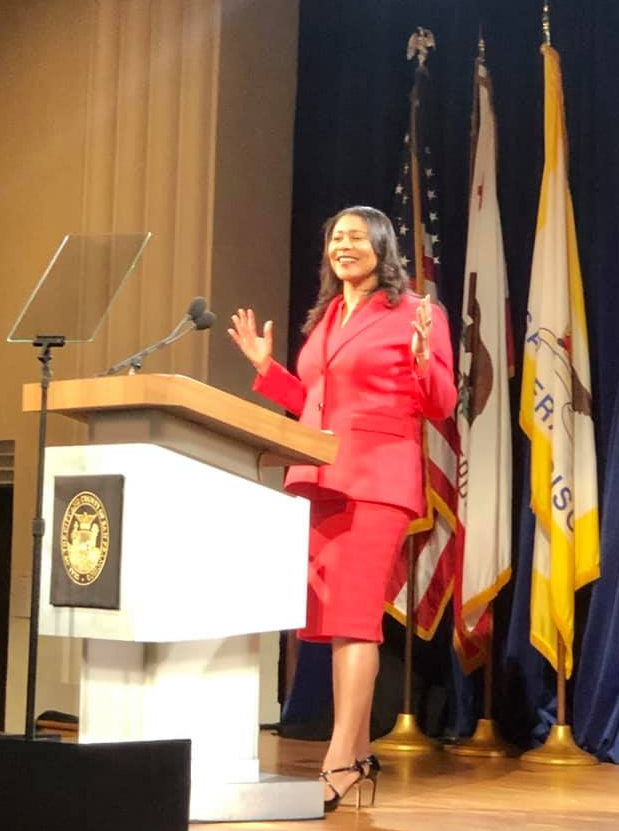
Mayor London Breed speaking at the the Women's March rally, Jan. 18, 2020, San Francisco, CA. (Photo: Sheila Fitzgerald/Shutterstock)
SF Mayor Breed Proposes Plan to Give $100 A Week to Welfare Recipients For Negative Drug Tests
The ‘Cash Not Drugs’ legislation is being seen as pretty toothless
By Evan Symon, July 30, 2024 1:21 pm
San Francisco Mayor London Breed and San Francisco City Supervisor Matt Dorsey unveiled a new proposed plan on Monday that would give select welfare recipients $100 a week for testing negative for illegal drugs.
The effort amongst city leaders to force those receiving city funds to undergo drug screening and treatment dates back to late last year. Amid a high crime rate, polls showing over half of Americans finding San Francisco unsafe, rising drug usage, and a record number of overdose deaths in the city in 2023, San Francisco residents have continued to support more and more reversals of failed policies in the last few years to allow for public safety concerns to grow.
As many of the overdoses and drug issues in the city can be linked back to those on welfare, city leaders began introducing more policies for involuntary drug treatment.
The first of these came in March, when Proposition F was passed by voters. Proposition F was passed by a large margin, 63,295 votes to 37,139 votes, or 63% to 37%. Prop F requires drug screening of individuals receiving County Adult Assistance Program (CAAP) benefits for individuals suspected by the city to be using illegal substances and requiring the individual to participate in treatment programs (if the treatment program is free) to continue receiving assistance benefits. As CAAP benefits go up to $687 per month, this would be a significant amount of money for those under the program.
However, the involuntary nature of Prop F worried many in the city, as it could create issues in giving out needed funds. Wanting something more friendly and voluntary, Breed, along with Dorsey, crafted the new “Cash Not Drugs” proposal, which they unveiled on Monday in San Francisco. According to the plan, select welfare recipients would get $100 a week for testing negative for illicit drug use. However, the program itself would not pay cash directly. Instead, money would be directed to a debit card system. If passed, it would be made a pilot program for three years and be administered by both the Human Services Agency and the Department of Public Health. Only CAAP uses screened for drug problems and referred for treatment would be eligible for the program.
“I want to make it just as easy to get treatment as it is to go out there and buy dope,” said Breed on Monday. “Whatever it takes to get people on the right path. That’s what we need to do.
“Some of you also know that I lost my sister to a drug overdose. She was down in the streets of the Tenderloin. It was definitely very difficult to get her the help she needs. I want to make it just as easy to get treatment, as it is to go out there and buy dope.”
Cash Not Drugs backlash
Dorsey added that he hoped that the legislation would help cut back on the number of overdoses, saying that “If we can make progress to help people get on the other side of their addiction, we will see progress on all kinds of things , from street conditions to retail theft to, hopefully and most importantly, reversing the level of overdoses. The underlying principal to ‘Cash Not Drugs’ is a simple one: a humane and effective approach to San Francisco’s drug crisis should also include rewarding good behavior and not just punishing bad behavior.
“Contingency management has been researched and studied for decades, and it is considered one of the most effective behavioral interventions for initiating and maintaining abstinence from drugs.”
While the program was brought out to much fanfare on Monday, critics quickly pointed out flaws in the proposal. Many noted that the voluntary nature of the plan would severely undercut how many people could be saved from potential overdoses. An issue of giving money to potential drug addicts was another worry, as was the pilot program being expensive and lasting three years – right in the middle of a $789 million city deficit.
“The ‘Cash Not Drugs’ legislation is being seen as pretty toothless,” said Rachel Garcia, a pollster who covers Marin County, San Francisco County and San Mateo County, to the Globe on Tuesday. “The big problem is that it is voluntary. He was right in saying that contingency management and rewarding good behavior are effective in fighting drug abuse. They are. But you need to have everyone on board to make it work. There are some drug users where $100 gets them enough drugs for one or two days, especially fentanyl. This incentive means nothing for them. Or worse, gives them the money needed to take a bad dose and O.D.
“And that is what is a potential bomb here. If someone overdoses, and they trace that money back to the city because the drug user waited enough time to get a clean test and then overdosed because they weren’t ready for it, then they are going to panic. It will make headlines.
“Plus add in how much this program will cost. A hundred a week for a bunch of users? This can rack up fast. If you made it involuntary, and showed how it could be offset by how much those drug users are costing the city, then you can make a good case.
“No polls are on this yet, although people love Prop F. But from a Twitter keyword search, people are not liking the cost, are not liking how it is voluntary, and especially don’t like their tax dollars going to drug users. And this is an election year for Breed. She’s showing she is trying, but it is also making a lot of voters mad. Her opponents can now easily say she is trying to give money to drug users for not taking drugs. And many will like what they are saying.”
The proposal was made official later on Tuesday, with Dorsey formally introducing it to the Board of Supervisors.
- Bill to Require Law Enforcement Disclosure if AI Was Used To Help Write Reports - August 7, 2025
- Gov. Newsom Files FOIA Request To ‘Expose True Cost’ Of L.A. Federal Troop Deployment for Anti-ICE Riots - August 6, 2025
- California Redistricting: How Newsom’s Plan Will Demolish Hard Fought GOP Gains - August 6, 2025





Hmm, not to long ago a San Francisco Mayor named Gavin Newsom had a cash for care program to combat homelessness! How did that work out?
Now we have a new scheme, cash for a drug free life. A hundred bucks(eye roll) no less.
There is no substitute for personal incentives, such as holding down a job, being stable to take care of dependents or not being pulled into crime to support a drug habit!
She needs something in her quiver of failed policies to look as though she is doing something to quell drug use in San Francisco!
A hundred bucks in the Biden/Harris era will buy her very little. A waste of tax dollars.
This is not a “drug free life”. They can still be completely stoned on weed, be stupid and lazy as a result, and get the free money. So they can use the money to buy even more weed. Excellent plan, comrades. You’re really thinking. All it needs now is a new title, “Cash for Weed Program”.
Love it, Protect Freedom —- the “Cash for Weed Program” 🙂